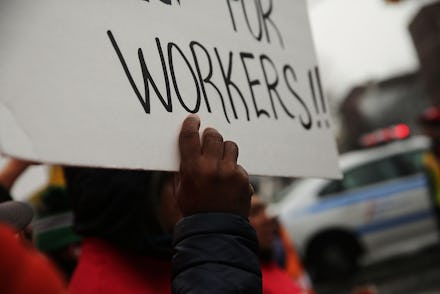Employers nationwide gave raises to avoid paying overtime. Now they're taking them back.

Garrett Hutcheson, a supervisor at a catering supply company in the southwest, was told he was getting an enormous raise: a $7,000 bump to his salary of around $40,000. The extra cash meant he could move his young family out of his girlfriend's parents' house. Instead, he'll be staying there, working long night shifts without overtime pay.
"This would've gotten us on our feet," Hutcheson said. "I've still got hope, but I'm not optimistic."
Pay increases like the one Hutcheson got, the result of a regulatory rule change by the Obama administration, were set to help more than 4 million workers. Just the expectation of the new rule triggered raises for workers across the country, including managers at Walmart, Nationwide Health Insurance and at least half a dozen universities.
Now, as a result of the ongoing tussle between the administration and federal courts regarding overtime pay that began in 2014, an injunction against the rule means a victory for big business interests — and rescinding of raises for Hutcheson and an unclear number of fellow workers.
The raises came after President Barack Obama, in 2014, boosted the minimum level of income workers can earn without being entitled to overtime pay. The Department of Labor rule change meant anyone making $47,476 or less could get overtime pay after they worked 40 hours in a week. The increases had lagged behind inflation and were therefore "overdue," Economic Policy Institute Vice President Ross Eisenbrey said.
An estimated 4.2 million American workers were set to benefit from the rule change, to the tune of $470 million. Some businesses, however, sought to sidestep the change by bumping their employees up past the $47,476 mark — a slick way out of paying overtime, but a boon to workers nonetheless.
"This would've gotten us on our feet."
Then, about a week before the rules would have gone into effect on Dec. 1, a federal judge in Texas issued an injunction, blocking the change nationwide because he decided the Obama administration was overreaching its authority. The Department of Labor is fighting Judge Amos L. Mazzant III's injunction, and the Justice Department filed an appeal on their behalf.
Employers across the country, though, reacted by taking back the raises. The setback affected employees of all kinds of businesses — ad agencies, hotels, restaurants, insurance companies, transportation and public education. At University of Nebraska, for example, Vice President for University Affairs Melissa Lee told Mic that 1,160 employees are in limbo as all proposed salary changes are on indefinite hold.
One employee of Vail Resorts, who asked to remain anonymous for fear of retaliation, was going to spend a $5,000 seasonal raise on health insurance and paying off credit card debt. Then, at 2 p.m. on Thanksgiving Day, the employee got notice the $6.59 billion winter sports corporation was taking back the raise.
"It's all perfectly legal, but it was perceived as such a callous thing to do," the employee said. "Everything was going to be OK. Now it's just going to be average, which in America is sub-average."
The employee nodded to Vail's luxurious brands and high profits. "For a few people to have a 5-star vacation, you need tons of people to lead a 2-star life," the employee said.
Vail confirmed to Mic it had adjusted its plans for raises. "When a federal court judge issued a nationwide injunction preventing those regulations from going into place," Kelly Ladyga, a spokesperson for Vail, said, "we told our employees that we are reviewing the court's ruling and the outlook for any updated [Fair Labor Standards Act] regulations and assessing appropriate next steps, which will include moving forward with certain compensation adjustments."
"For a few people to have a 5-star vacation, you need tons of people to lead a 2-star life."
Mic, however, obtained internal Vail documents where the company informed employees the raises would not be going through. Asked about the documents, the Vail spokesperson referred back to the initial statement and declined to further clarify the discrepancy.
The new regulations Vail is holding out for may not be in place before Obama hands over the White House to Donald Trump. Trump's pick to run the Department of Labor, which sets overtime regulations, is workers' rights nemesis and fast-food CEO Andrew Puzder.
Undoing President Obama's plan for overtime, however, would be tough work, no matter who takes over the Department of Labor, according to the Economic Policy Institute's Ross Eisenbrey. Eisenbrey, who thinks the Texas judge's injunction will be overturned on appeal, says Trump will have bureaucratic obstacles to overcome if he wants to reverse the new rules.
"President Donald Trump couldn't unilaterally yank the rule — he'd have to go through a long, involved process," Eisenbrey told Mic. "It took a little more than two years for the Obama administration to do this, and it'll take a good long time for the Trump administration to undo it successfully."
Eisenbrey thinks Trump could face political obstacles if he does invest his administration's energy in reversing rules which would affect 4 million workers.
"It's a test for what he really stands for," Eisenbrey said. "He claims to care about the American worker. To take this away from millions of people would show something very different."
Did you or someone you know get a raise then have it rescinded? Get in touch with Jack at jack@mic.com and tell him your story!